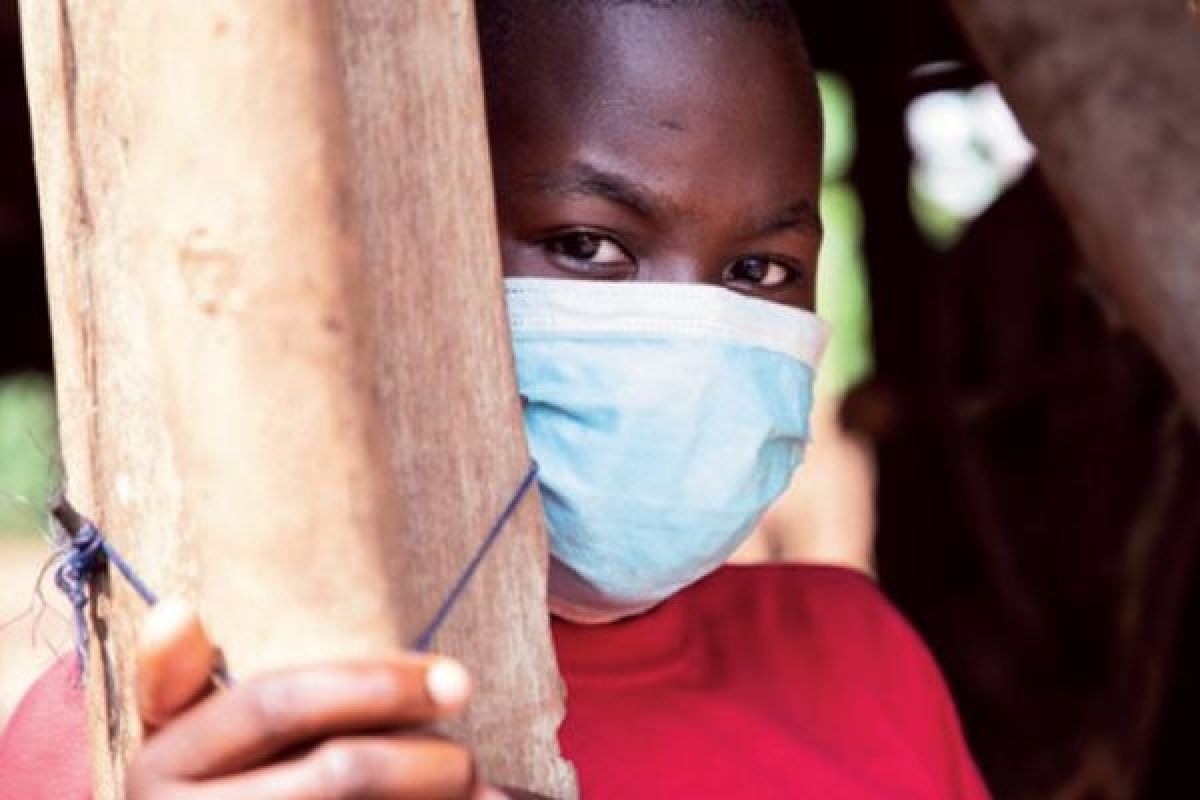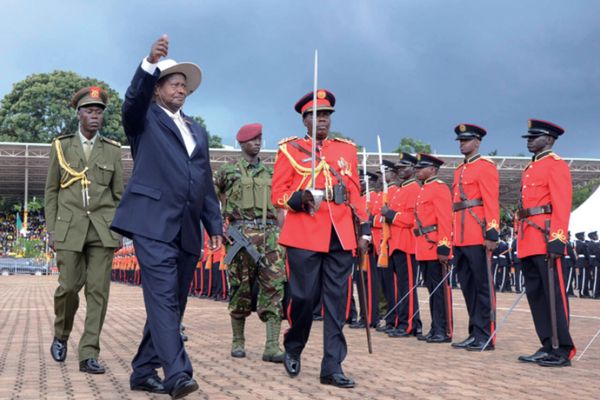
As schools and business finally open after nearly two years, Ugandans find they have sunk into economic hardship as a result of President Museveni’s Covid power grab. By Issa Sikiti da Silva in Kampala.
For the second time in a week, Doreen looks at her six children and sobs, wondering what the future will hold for her family after she was forced to stop her cross-border trading business due to the strict Covid-19 measures.
The single mother used to travel to Kenya and the Congo before the pandemic to make a living.
It wasn’t her family’s main source of income. Back then, she wasn’t a single mother at all.
The 40-year-old’s husband left her for a wealthy woman after the company he worked for closed down due to Uganda’s brutal lockdown in early 2020.
Two years on, and life has got even harder for Doreen and millions of Ugandans who depend on informal work to survive.
On June 18, 2021, President Yoweri Museveni announced further drastic restrictions on national television, including another sweeping 42-day lockdown.
The social and economic fall-out of shuttering nearly all businesses, schools and nationwide transportation has been crushing on East Africa’s third-largest economy.
Restrictions were slapped on movements in and out the country, making life for female traders like Doreen impossible.
A curfew was also imposed, and places such as bars, nightclubs, gyms and pools were closed — and remained closed until January this year.
The restrictions have had a devastating impact on families like Doreen’s, with the World Bank warning it risks setting the country back years.
Despite the economy growing by an average annual growth of 4.5 per cent in the five years to 2016 and an impressive 7.5 per cent in 2019, severe food insecurity and inequality is worsening in Uganda.
Women and children who were already living hand-to-mouth are the most affected by the economic crisis.
Particularly vulnerable are children living in cities and slums.
One in 20 children born in Uganda will die before their fifth birthday. Malnutrition is high and stunting affects 29 per cent of children aged five years and below, according to the World Bank.
A March 2019 report by UNICEF found that 56 per cent of Uganda’s children experience multidimensional deprivations and a low standard of living, while more than 60 per cent of children in households with three or more kids live in multidimensional poverty.
Two hundred metres from where Doreen lives, a pensioner longs for freedom and a better life, complaining of rising cost of living, hard times and dictatorship.
‘We are sinking deep into poverty. I don’t know when this suffering will end. If the situation was already dire before the pandemic, now it’s even worse,’ the pensioner said, yawning and looking hungry and sick.
‘I’m worried about the new generation. I hope and pray that the West, which decides who ascends to power in Africa, stops supporting [Museveni] and removes him from office. Ugandans are at crossroads, we can’t take it anymore,’ he added emotionally.
It’s a situation that has been compounded further by Uganda’s shutdowns, wrecking an already fragile economy, which even the government conceded had driven hundreds of thousands into ‘extreme poverty’.
Meanwhile, independent analysts estimated last year that a quarter of urban dwellers like Doreen had lost ‘100 per cent of their daily income’ as a result of restrictions, enforced by soldiers with shoot-to-kill orders.
Early on in the outbreak, more people were killed by security forces enforcing restrictions than the virus itself.
Doreen pats her five-year-old daughter and tells her to stop crying.
The girl is sick and the blistering heat in the capital, Kampala, is making the toddler increasingly restless.
‘I love my children and I don’t want anything to happen to them,’ she said, serving up a meal of raw plantain for her hungry kids.
‘But I’m sure this old man is just using the Covid as an excuse to stamp his authority and reinforce the grip on power,’ she added, in reference to Uganda’s 77-year-old authoritarian leader.
Open criticism of Museveni and government policies can land one in jail in Uganda, sometimes never to be heard from again.

President Museveni (above) rules Uganda with an iron fist.
Day and night, intelligence operatives patrol the streets, markets and churches, looking for suspicious activities or people that they believe could constitute a threat to Museveni’s 36-year rule.
Unfazed by criticism, in August last year the government banned 54 NGOs for allegedly failing to comply with legislation covering their activities, including operating with expired permits, failing to file accounts or failing to register with the authorities.
Some of these suspended NGOs appear to have taken part in an election-monitoring operation on polling day in last year’s contested presidential ballot.
Over 5,000 people were expected to lose their jobs as a result of the closure of these organisations, according to local media.
Uganda has one of the most dynamic and resilient civil society movements in Africa.
Opposition groups and religious leaders regularly criticise the president’s dictatorial and repressive methods, and slam his government’s unfair and ill-conceived policies.
Museveni won a sixth term in office in January 2021, in an election marred by unprecedented brutality and repression.
The poll was marked by a violent campaign which saw the arrest and beating of opposition figures, attacks on the media and the deaths of dozens of people.
Museveni’s security forces targeted opposition candidate Robert Kyagulanyi, a former pop star popularly known as Bobi Wine, and his supporters.
The opposition party and the local and international community rejected Museveni’s re-election as fraudulent.
‘He didn’t win. It’s Bobi Wine who won the elections. But what can we do since we have no power, no money and no guns,’ a man identified as Nicolas told NewsAfrica.
‘If you dare to protest, you risk losing your life. The president’s security thugs are merciless and behave almost like cannibals.’
Before the elections, Nicolas dreamt of a scenario where Museveni would lose the elections, accept defeat and leave power peacefully.
‘I knew it was an unlikely scenario in a continent dominated by political predators who adore power more than anything else. However, dreaming is not a crime. If he did it, that would have absolved all the sins he committed in this country during the nearly four decades in power. He shot himself in the foot once again by stealing the elections.’
Political analyst Kris Berwouts said: ‘I don’t exclude that in the near future sitting presidents will refuse to recognise their defeat. It is very important that Edgar Lungu acknowledged Hakainde Hichilema’s victory in Zambia, even if, initially, we had the impression he wouldn’t.’
Ugandans under 35 – who constitute over three-quarters of the population – have only known one president. Disgruntled by his repressive regime, many young people are dreaming of leaving the country as hope for change in leadership fades and progress is yet to come.
Every morning across Uganda’s big cities, hordes of young men and women sit idly at street corners, wondering where their next meal will come from and what to do to get out of the catastrophic social situation.
‘What will he say now about this rising poverty and joblessness? Blame Covid?’ a jobless university graduate asked.
‘Our lives have not improved even when the economy was performing well because the money disappeared into the political elite’s pockets.’
While President Museveni’s autocratic style may not be popular, many in Uganda still pin their hopes on the ruling National Resistance Movement (NRM), believing party membership will earn them preferential treatment, including government tenders, cash for small business and food parcels.
Corruption and party favouritism seem to be rising in the country, with Uganda slipping to 142nd place on Transparency International’s 2020 Corruption Perceptions Index.
Only 38 countries on the planet were considered more corrupt.
‘A majority of Ugandans think that corruption is getting worse in their country and that their government is doing a bad job of fighting it,’ the Daily Monitor columnist Charles Onyango Obbo noted at the time.
‘Most say ordinary people risk retaliation if they report corruption to the authorities, findings from a recent Afrobarometer survey show.
With hunger and misery increasing, Doreen and her children returned to the countryside because she could no longer afford to pay rent and feed her family. ‘She thought the best way to survive out of this misery was to return home to start rice and plantain farming so that she can feed her family. Besides, her last-born got very sick and almost died,’ a source close to Doreen’s family confided.
‘The world must hear us out. We are really struggling. Food insecurity is dangerously rising in this country.’
However, despite making up 25 per cent of the country’s gross domestic product (GDP), dependence on agriculture seems to be increasing hunger in Uganda.
In a country that suffers from a 30 per cent malnutrition rate, some rice cultivators starve as they sell all the food, the non-profit Borgen Project found.
‘While the effects vary, agricultural reliance in Uganda has increased supply, but access to food has not necessarily increased. This leads to high levels of food insecurity.’
Meanwhile, landlords in Kampala continue mass evictions of their tenants, many of whom have been unable to pay rent for months during the pandemic.
It has destabilised communities and left thousands homeless and destitute, including children.
A man whose bar has been closed since the first lockdown in March 2020 has been thrown out of the house he was renting in the outskirts of the city.
‘I don’t know what to do,’ he lamented.
‘This is my only way of survival.’



